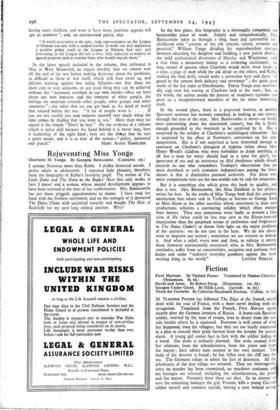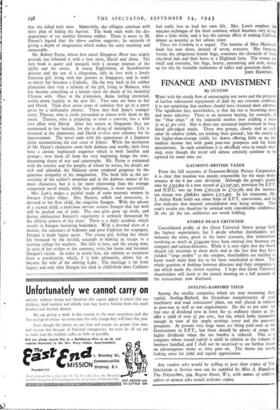Fiction First Harvest. By Vladimir Pozner: Translated by Haakon Chevalier.
(Heinemann. 8s. 6d.) David and Anna. By Robert Payne. (Heinemann. los. 6d.) Imogen Under Glass. By Hilda Lewis. (Jarrolds. gs. 6d.)
Three for Cordelia. By Catherine Macdonald Maclean. (Collins. 7s. 6d.) M. VLADIMIR POZNER has followed The Edge of the Sword, which dealt with the rout of France, with a short novel dealing with the occupation. Translated from the French, First Harvest opens shortly after the German invasion of Russia. A home-sick Bavarian soldier, worried by the turn of events, tries to desert from the sea- side hamlet where he is stationed. Everyone is well aware of what has happened, even the villagers, but they are too busily concerned in a plan to conceal their grain harvest from the- invader for serious alarm. A young girl comes face to face with the soldier hiding in a wood. She alone is seriously alarmed. She seeks counsel from her relations, from the schoolmistress, from the priest and from the mayor ; their advice runs counter to her own instinct: The body of the deserter is.found; he has fallen over the cliff into the sea. The Germans refuse to admit the fact of desertion. All the inhabitants of the tiny village are arrested. They are interrogated; since no murder has been committed, no murderer confesses, and ten hostages are selected, including_ the schoolmistress, the priest and the mayor. Presently these three are shot. In an attempt to save the remaining hostages the girl, Yvonne, kills a young German soldier herself and commits suicide, leaving a note behind saying
that she killed both men. Meanwhile, the villagers continue with their plan of hiding the harvest. The book ends with the dis- appearance of yet another German soldier. There is more to M. Pozner's legend than the above outline suggests ; he succeeds in giving a depth of imagination which makes his story touching and memorable.
Mr. Robert Payne, whose first novel Singapore River was widely praised, has followed it with a love story, David and Anna. The new book is queer and unequal, with a strange mixture of the idyllic and the exotic. A young Englishman, of Scandinavian descent and the son of a clergyman, falls in love with a lovely Eurasian girl, living with her parents in Singapore, and in order to marry her becomes a Catholic. On the way back to his rubber plantation they visit a relation of the girl, living in Malacca, who has become something of a hermit since the death of his beautiful Chinese wife. Once at the plantation, Anna, feeling protected, settles down happily in the new life. Two sons are born to her and David. Then after seven years of isolation they go-to a party given by a millionaire planter. There they find Anna's younger sister, Therese, who is easily persuaded to return with them to the estate. Therese, who is preparing to enter a convent, has a wild love affair with David. After her return to Singapore they are summoned to her bedside, for she is dying of meningitis. Life is resumed at the plantation, and David evolves new schemes for its improvement. The novel ends with the appearance of a Japanese plane reconnoitring the east coast of Johore. While the mysticism of Mr. Payne's characters seem both dubious and woolly, their lives have a certain haphazard sequence which is both familiar and strange ; over them all from the very beginning hangs the ever- deepening threat of war and catastrophe. Mr. Payne is entranced with the country and the peoples of whom he writes, his details are rich and splendid, the Malayan scene rendered gorgeous by the generous sympathy of his imagination. The book fails in the un- certainty of the author's intention and in the dubious nature of his main characters, but it is far more interesting than the average competent novel which, while less ambitious, is more successful.
Mrs. Lewis makes a painful study of some neurotic women in Imogen Under Glass. Mrs. Hutton, selfish and possessive, is devoted to her first child, the exquisite Imogen. With the advent of a second child, a malicious servant assures Imogen that her nose will be pushed out of joint. The two girls grow up rivals, and during adolescence Imogen's superiority is seriously threatened by the athletic powers of her sister. There is a slight accident, which results in Imogen becoming bedridden. With a devoted slave of a mother, the sanctuary of bedroom and poor Cathleen for scapegoat, Imogen is made happy again. The young girl, feeling her whole life menaced by the invalid, succeeds in making an escape to a training college for teachers. She falls in love, and the young man, in spite of her wishes to the contrary, visits her home and becomes Imogen's victim. In order to marry him, she submits to treatment from a psychiatrist, which, if it fails ultimately, allows her to become the wife of the adoring Luke. The marriage is far from happy, and only after Imogen has died in child-birth does Cathleen feel really free to lead her own life. Mrs. Lewis employs the staccato technique of the short sentence, which becomes very trying after a little while, and it has the curious effect of making Cathleen almost as neurotic as her odious sister.
Three for Cordelia is a sequel. The heroine of Miss Maclean's book has now three, instead of seven, evacuees. Her frequent visitor, the ubiquitous female Sage, continues the chronicle of three city-bred lads and their hosts at a Highland farm. The events are small and everyday, but Sage, hearty, patronising and arch, makes up for this by veritable hailstorms of italics and quotation marks.
JOHN HAMPSON.



























 Previous page
Previous page